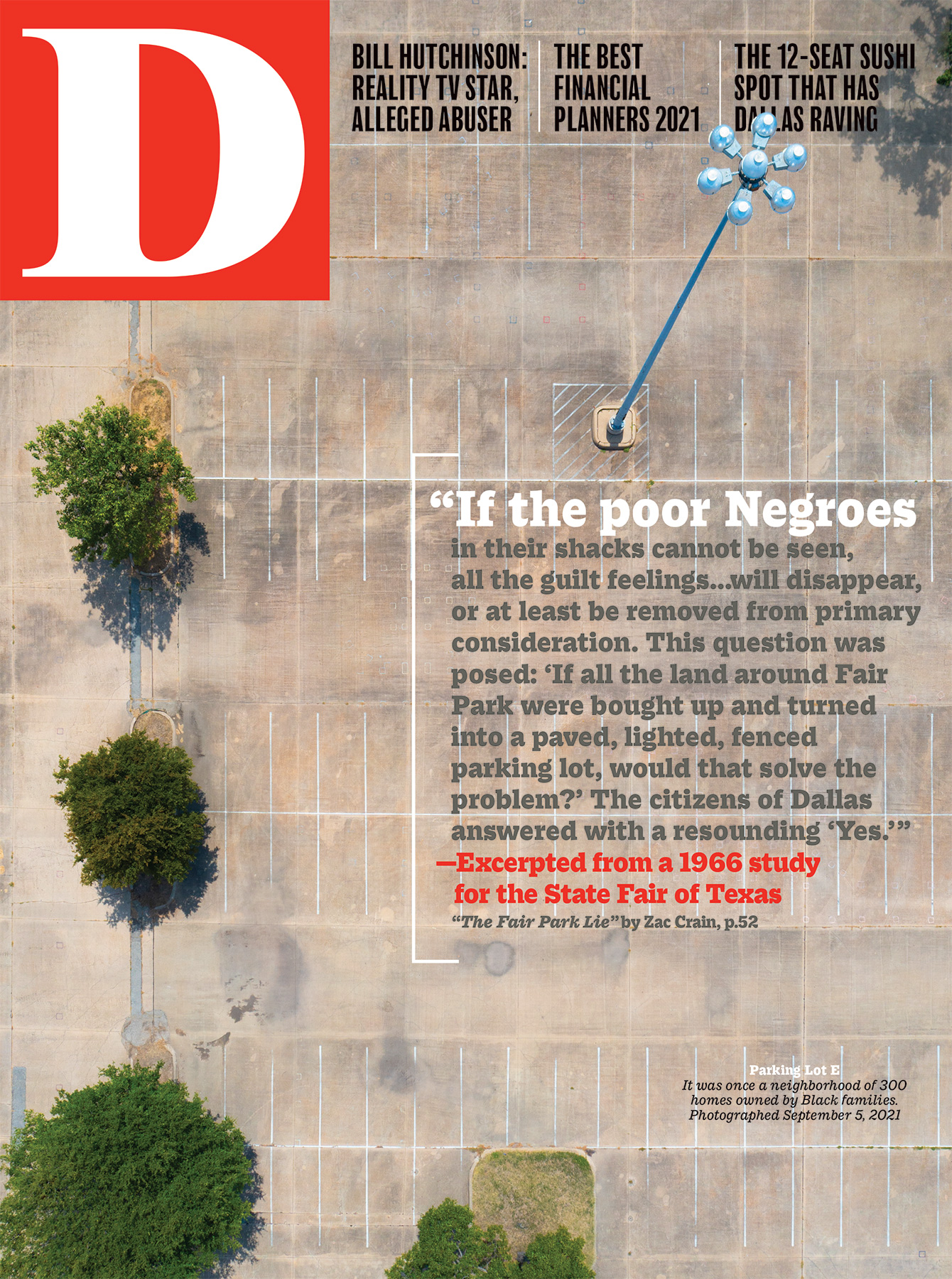The chatter among Dallas’ hoi polloi throughout the spring, summer, and into the fall has been, of course, about Mike McCarthy’s clock management and the vaccines and whether the 2021 Tesla Model S Plaid really is fast as all that. But the monied have been wagging their chins for months about the SALT cap and the Angel of Death loophole. In other words: taxes.
For the wealthy, a comeuppance is coming. President Joe Biden wants the rich to pay a bigger share in taxes so he can “Build Back Better” by spending trillions of dollars on infrastructure.
“Yeah, we’ve been talking about whatever Washington is going to do,” one of Dallas’ top-tier earners, an attorney who has done deals with the likes of Mark Cuban, tells me. “We’re mainly worried about capital gains going up. But capital gains will likely top out at 25 percent. No way they’re going to 43 percent or whatever the percentage was that was bandied about in the spring. That extra 5 percent still sucks, though.”
Those extra percentages—and how to get around them—are just the kinds of things that the rich have been yammering about at the bar at Al Biernat’s and on the 19th hole at Preston Trail and at that one four-top on the little patio at Cafe Pacific where you can see everyone who comes and goes because you’re right next to the valet stand. Mostly, though, and in part due to our masked-up, distanced times, I’m told that these conversations have unfolded in more mundane fashion, by phone in a recently remodeled home office or just by text.
“Does your company have an outlook on the likelihood of the passage of the new tax laws?” one wealthy Dallasite recently texted to a much wealthier Dallasite—a centimillionaire, in fact. “We’re all guessing, like everyone else,” the centimillionaire replied. The conversation continued, diving into a proposed 3 percent surcharge on adjusted gross income over $5 million, which happens to be the closest thing to an honest-to-goodness wealth tax in all the serious proposals that have come from the Biden White House or the Democratic-controlled Congress this year. “That 3 percent will kill me if I have a liquidity event in one of my private deals,” the less wealthy texter continued. The centimillionaire shrugged it off. “Hard to believe it would pass,” he said. “But even harder to proactively defend against it.”
And therein has been the problem for the rich all year long: for all the political blustering there’s been about new taxes on the rich, no one knows just how deep into his pocket the Biden administration would be able to reach—or which pockets it might try to reach into. In recent months, the Biden administration and congressional Democrats have churned through one tax-the-rich proposal after another. Many were harmlessly deflected by what some call “the wealth defense lobby.” Others, like that sucky 5 percent boost on capital gains, lingered.
That left local wealth managers scratching their heads about how to advise their high-net-worth clients. Many of those planners whom I contacted declined to comment for this story, in part, they said, because the tax changes we’d be talking about were likely to change and in part because they were already overwhelmed with calls from clients. But John Bergner, a shareholder and chair of the Wealth Preservation Practice Group at Winstead PC in Dallas, tells me, “When Biden was elected, a lot of people were concerned that taxes would go up, especially estate taxes, and that’s made us very busy for the last two months of last year and into the spring. Very, very busy.”
On the day we spoke, Bergner had gotten to the office early even though he’d been at work until 11 pm the night before answering questions from clients. Bergner says those clients were not panicking but, rather, were preparing. “They’re hearing almost daily about some change in tax legislation, and they want to act, so we have to be ready to advise them.”
The SALT cap, as some call it, limits taxpayers to writing off a maximum of $10,000 in state and local taxes on their federal returns. “That killed a lot of us,” a wealthy Highland Park resident told me.
Still, that’s easier said than done when the tax laws remained in such a state of flux all year. Take that SALT cap, for instance. For months this year, both Republicans and Democrats were talking about removing the cap imposed during the Trump years on state and local tax (hence SALT) deductions. The SALT cap limits taxpayers to writing off a maximum of $10,000 in state and local taxes on their federal returns.
“That killed a lot of us,” a wealthy Highland Park resident tells me. “Rich people are paying property tax bills that could total $150,000 between their principal residence and their lake houses or ranches.” Add in sales taxes, he says, and the wealthy could have something like $80,000 in tax savings right there, without the SALT cap. “I would trade off going back to 39.6 as the top marginal rate in a nanosecond if I could get my SALT deductions at 100 percent,” the well-heeled HPer concluded. The bad news for him: blasting away the SALT cap, as the summer wore into fall, looked less and less likely.
And then there is the Angel of Death loophole, which allows wealthy heirs to bypass capital gains on big investments that are handed over to them when a family member dies and they inherit that family member’s appreciated assets. Biden targeted this loophole (technically it’s called a “step-up in basis”) earlier this year, but powerful lobbying from some former congressional Democrats had kept the Angel of Death alive as of press time.
Other proposals seemed to have more traction, such as raising the top marginal income tax rate on people earning more than $400,000 a year from 37 percent to 39.6 percent or boosting the capital gains rate from 20 percent to 25 percent, with the current 3.8 percent surcharge tacked on to fund portions of the Affordable Care Act, aka Obamacare.
Gift taxes were another area that seemed ripe for change. In 2017, the wealthy were allowed to give heirs or others a total of $11.7 million. But Democrats proposed cutting that in half, and some members of Congress wanted that cut to be effective as soon as new tax legislation passed both chambers.
One of Dallas’ wealthy—a private equity type whose family did well when Texas deregulated its energy market—tells me that this was not a big issue for him because “everyone has already given away their $11.7 million.” But the change did put one of Bergner’s clients in a bind. “She’s 100 years old,” Bergner says. “She grew up in a rural area of Texas and married and had several kids, and her husband died young, so she took over his company and built it into something big. That family business provided for the family. They’ve always paid income taxes. And now, at her death, we want to make sure there’s no estate taxes to the extent possible.”
Bergner’s client had used only half of her gift allotment as of the early fall, when Congress was talking about cutting the gift allotment in half. If she gave away the full $11.7 million before that cut happened, she’d have no money left in her own name. If she did not give away the full $11.7 million, her children would have to pay estate taxes—at 40 percent—on the money that remained. That could leave each of her children with a six-figure tax bill. “That’s money that could be spent in the community or reinvested in other businesses,” Bergner says. “So it creates a tension between the older and younger generation.”
And yet, as difficult as the changing tax landscape has been for financial planners this year, ultimately all the talk over taxes on the rich was, for many of the rich, just talk. “You know,” the Highland Park resident tells me, “no one is talking about moving their assets offshore or anything. This is just the way it is. Capital gains were 28 percent when I moved here in 1986. They went down to 20, then to 15, then back to 20. If they go to 25 now, I’m not going to get worked up about it.”
He then recounted a chat he’d had with some similarly wealthy friends, which was probably at Al’s but maybe at Cafe Pacific. Either way, each party agreed that no matter how taxes have changed under the past five presidencies, they’ve all continued to make money.
“And so far, so good under Biden, too,” he says. “The tax laws change more than Texas weather. So who cares?”
This story originally ran in the November issue of D Magazine with the headline, “The Tax Worries of the Wealthy.” Write to [email protected].







